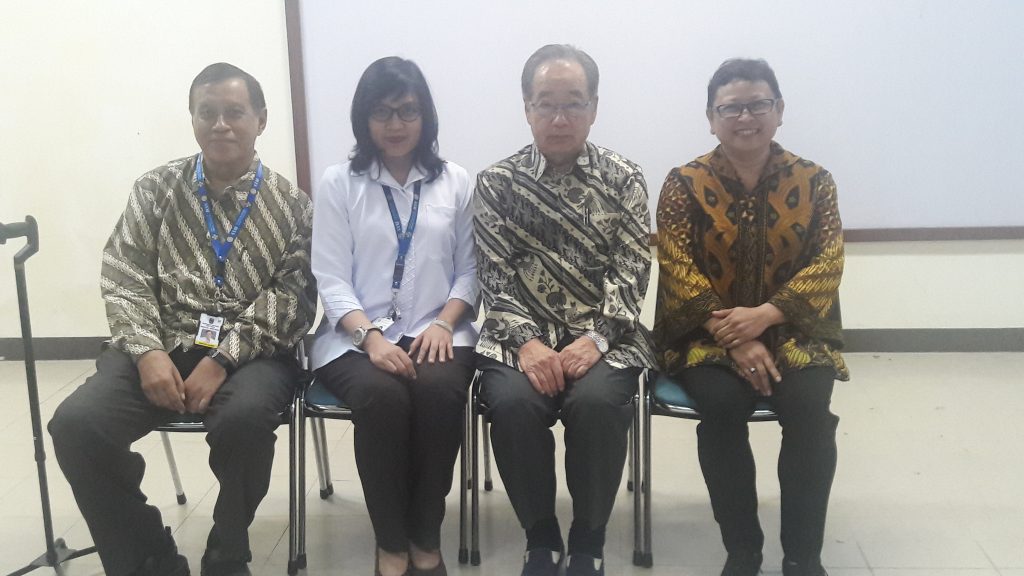{:en}As a part of the Universitas Airlangga World Class University (WCU) program, visiting professor and senior leprosy researcher Dr. Shinzo Izumi presented a Guest Lecture in front of more than 80 participants. This lecture was hosted by ITD on Wednesday, 25 October 2017 and was targetted at postgraduate students (medical, public health, and social sciences), social workers, medical practicioners and leprosy control officers from Dinas Kesehatan Provinsi dan Kota/Kabupaten.
Although Dr. Izumi has a lot of experience in leprosy research along with his extended knowledge on the immunology and latest development on leprosy transmission, he chose to cover the human right aspect to raise awareness on the other needs of leprosy patients that are often unmet. Talking retrospectively from the pre-scientific era, how the Norwegians first encountered the disease outbreak and how it was handled until the major change comes as the science progress. Dr. Izumi also shared how the disesase first entered Japan and what impacts it had brought socially and culturally to his home country.

Dr.Izumi’s lecture was put into context by Dr.Phil. Toetik Koesbardiati from the Social and Political Science Faculty (FISIP) of Universitas Airlangga on the second segment of the lecture. As an anthropologist, Dr. Koesbardiati had been taking interest in the historical and sociocultural aspect of leprosy in Indonesia. She had long researched the origin of the disease in Indonesia as well as the different socio-cultural impacts of living with leprosy patients in different ethnic groups in Indonesia.
Prof. Indropo Agusni, dr., Sp.KK(K), acting as the moderator of the lecture, concluded from the two speakers that a better understanding of leprosy disease, not only in medical context but also from the sociocultural point of view, needs to be continually updated and will result in a better acceptance of leprosy patients in the society.{:}{:id}Sebagai bagian dari program Universitas Airlangga World Class University (WCU), profesor tamu dan peneliti kusta senior Dr. Shinzo Izumi mempresentasikan Kuliah Tamu di depan lebih dari 80 peserta. Kuliah ini diselenggarakan oleh ITD pada hari Rabu, 25 Oktober 2017 dan ditargetkan pada mahasiswa pascasarjana (medis, kesehatan masyarakat, dan ilmu sosial), pekerja sosial, praktisi medis dan petugas kontrol kusta dari Dinas Kesehatan Provinsi dan Kota / Kabupaten.
Meskipun Dr. Izumi memiliki banyak pengalaman dalam penelitian kusta bersamaan dengan pengetahuannya yang luas tentang imunologi dan perkembangan terakhir pada transmisi kusta, dia memilih untuk mencakup aspek hak asasi manusia untuk meningkatkan kesadaran akan kebutuhan pasien kusta lainnya yang seringkali tidak terpenuhi. Berbicara secara retrospektif dari era pra-ilmiah, bagaimana orang Norwegia pertama kali menemukan wabah penyakit dan bagaimana penanganannya sampai perubahan besar terjadi saat kemajuan sains. Dr. Izumi juga menceritakan bagaimana orang yang baru pertama kali memasuki Jepang dan dampak apa yang telah dibawa secara sosial dan budaya ke negara asalnya.
Dari kiri ke kanan: Prof. Indropo A., dr., SpKK (K) (Kepala Laboratorium Kusta di ITD), dr. Cita Rosita SP, Sp.KK (Sekretaris Badan Perencanaan dan Pengembangan Universitas Airlangga), Dr. Shinzo Izumi (Visiting Professor UNAIR 2017), Dr. Phil. Toetiek Koesbardiati (Fakultas Ilmu Sosial dan Ilmu Politik Universitas Airlangga)
Kuliah Dr.Izumi dimasukkan ke dalam konteks oleh Dr.Phil. Toetik Koesbardiati dari Fakultas Ilmu Sosial dan Ilmu Politik (FISIP) Universitas Airlangga di segmen kedua ceramah. Sebagai antropolog, Dr. Koesbardiati telah memperhatikan aspek historis dan sosiokultural kusta di Indonesia. Dia telah lama meneliti asal penyakit ini di Indonesia serta berbagai dampak sosial budaya hidup dengan pasien kusta di berbagai kelompok etnis di Indonesia.
Prof. Indropo Agusni, dr., Sp.KK (K), bertindak sebagai moderator ceramah, menyimpulkan dari kedua pembicara bahwa pemahaman penyakit kusta lebih baik, tidak hanya dalam konteks medis tapi juga dari sudut pandang sosiokultural, perlu terus diperbarui dan akan menghasilkan penerimaan yang lebih baik terhadap pasien kusta di masyarakat.{:}
